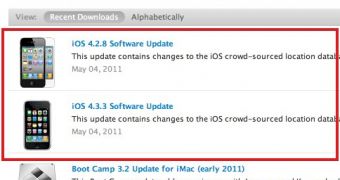Weeks ahead of its anticipated release, iOS 4.3.3 is now available for iDevice owners looking to prevent their location from being tracked. An iOS 4.2.8 IPSW is being served specifically for CDMA iPhone users as well.
Promised by Apple to arrive in ‘weeks’, iOS 4.3.3 and iOS 4.2.8 have made an early appearance on the company’s public servers, with improvements and bug fixes mostly targeting the ‘LocationGate’ issues.
The documentation for iOS 4.3.3 says “This update contains improvements and other bug fixes including:
- Fixes an issue that occasionally caused blank or frozen video during a FaceTime call - Fixes an issue that prevented some international users from connecting to 3G networks on iPad Wi-Fi + 3G - Contains the latest security updates”
For CDMA (Verizon) iPhones, this update “contains changes to the iOS crowd-sourced location database cache including:
- Reduces the size of the cache - No longer backs the cache up to iTunes - Deletes the cache entirely when Location Services is turned off”
Both releases also contain security content originally included in previous iOS software updates, according to Apple.
While iOS 4.2.8 is solely applicable on CDMA iPhone 4 units, different versions of the iOS 4.3.3 IPSW can be obtained for iPhone 4 (GSM model), iPhone 3GS, iPad 2, iPad, iPod touch (4th generation), and iPod touch (3rd generation).
Supported languages include Français, Dansk, Português, Slovak, Czech, Norsk Bokmål, English, Croatian, Hebrew, Svensk, Español, Thai, Pусский, Português Brasileiro, Greek, Deutsch, Ukrainian, Italiano, Romanian, Turkish, Hungarian, Polski, Nederlands, Suomi, Japanese, Chinese, and Korean.
Those looking to update their firmware can now connect their iDevice to iTunes and select the ‘check for updates’ option.
Users are advised to back up the contents of their devices before proceeding with the software update process.
Those employing jailbreaks or carrier unlocks might want to check with those who provide the hacking tools for information on whether these releases break them or not.

 14 DAY TRIAL //
14 DAY TRIAL //